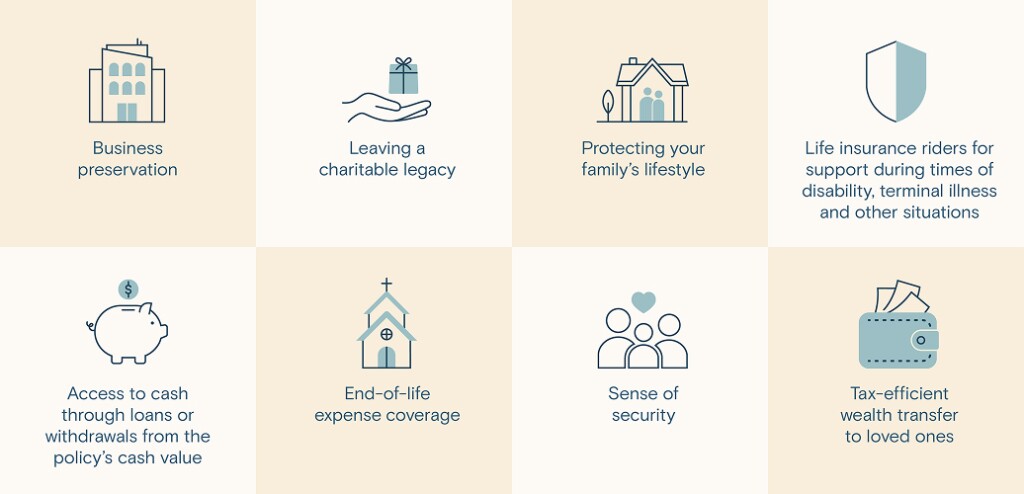Whether you currently have dependents (or may in the future), or you're passionate about leaving a legacy to the organizations and people you love, life insurance can help you reach your financial and life goals. Here's how.
Types of life insurance: Term vs. permanent
For most families, the most essential function of life insurance is to replace lost income when you die—potentially up to 20 years or more. Beyond that need, the right coverage can provide further comfort for your family. The two primary types of life insurance coverage are term and permanent.
1. Term life insurance
If you want to protect loved ones for a certain chapter of your life—like while your children are financially dependent on you—
2. Permanent life insurance
If you don't want your life insurance to expire, then permanent life insurance options like whole life, universal and variable universal life insurance may better suit your goals.
The most common and simplest form of
The benefits of life insurance
"When you think about your life insurance needs, it starts with self-reflection: Who depends on you? How long do you need to provide for your kids? But also, how do you want to make a difference? Life insurance can support these goals," says Todd Yeiter, director of advisor support Thrivent.
Consider these 8 key advantages of life insurance:
1. Life insurance offers income replacement & support for your loved ones.
While both term life insurance and permanent life insurance offer protection through a guaranteed death benefit, permanent life insurance can also accumulate cash value that you can tap into while you're still living. "We have life insurance for the benefit of each other and our kids—protection is for the survivors," Yeiter explains.
Life insurance can help your loved ones maintain their standard of living and give time and space to process grief instead of getting tied up in financial implications. "Life insurance provides transition time to mourn. That matters." says Yeiter.
Life insurance can provide transition time to mourn. That matters.
2. It can help you leave a memorable legacy.
Life insurance gives your family the financial support to honor you in the way you'd want. "If something happens to my wife, I want to do something significant—possibly make a sizeable donation to a place or cause that is meaningful in her heart. It's not just about income replacement, it's about institutions important for our daughters and showing her legacy in a meaningful way," says Yeiter.
3. Term insurance offers affordable coverage to fulfill a short-term need.
Whether you want to put your kids through school, pay off a mortgage, or cover other debt if something happens to you,
For example, if you have minor children or adult children who still need your financial support, you may opt to choose a term insurance option to protect them for as long as they need that assistance.
4. Permanent life insurance can be used like an investment while you're alive.
Permanent life insurance options allow you to potentially grow your money through your
Whole life: Each year, the policy’s cash value is guaranteed to increase.Universal life insurance: Earns a guaranteed minimum interest rate annually.Variable universal life : Offers the opportunity for market-driven growth.
5. Life insurance can protect the lives of two people.
If you have a spouse you want to ensure is taken care of down the road, life insurance could help.
Life insurance can also help you care for special needs dependents. In particular, a survivorship life insurance contract's death benefit can be used to continue care for
- Help cover the costs of a replacement caregiver.
- Supplement income for a dependent to remain in a comfortable living situation.
6. Life insurance can be tax-efficient, for you & your heirs.
Families that anticipate income and estate taxes or need help paying for funeral expenses can look forward to the federal
Additionally, money within a life insurance policy is also one of the only financial items that won't increase taxes on your Social Security income.
7. Life insurance can serve as a source of cash if you need it.
Depending on your coverage, you can
The cash value of life insurance can be used for things, such as:
- Providing a retirement income stream.
- Paying for a child’s education.
- Making a down payment on a home.
- A source of emergency funds.
Keep in mind that when you access the cash value of your life insurance contract, you’ll reduce your death benefit. You also may have to pay fees or taxes, so it's best to talk with your financial advisor before you take action.
8. Life insurance can help with business succession.
Whole life insurance can offer some unique
This may best be explained through an example. Let’s say a Thrivent financial advisor served a client, Robert, who purchased a whole life insurance contract with
Unfortunately, several years after buying the life insurance contract, Robert became severely disabled. Thrivent paid the whole life insurance premiums due to that waiver of premium rider, which not only kept the policy in force, but helped build cash value.
When the business came into some financial difficulties, Robert was able to access the cash value of the whole life insurance policy through a loan to keep the business running. When he died, the loan was paid out from the death benefit with the remainder going to his family-run business.
Additionally, if Robert's business hadn't experienced difficulties, he could have structured his policy to provide tax-free income as a supplement to his business earnings should he need it. This way, he would have still had the protection from his policy while also personally benefiting from it.

Life insurance: A conversation guide
Learn more about how life insurance can benefit you
"Ask yourself: Who do I want to be present for? Who's important to me? When you consider these, life insurance can make a significant difference, and you can evaluate the connection between its price and its impact," says Yeiter.
Ready to talk with a financial advisor about your coverage options?







